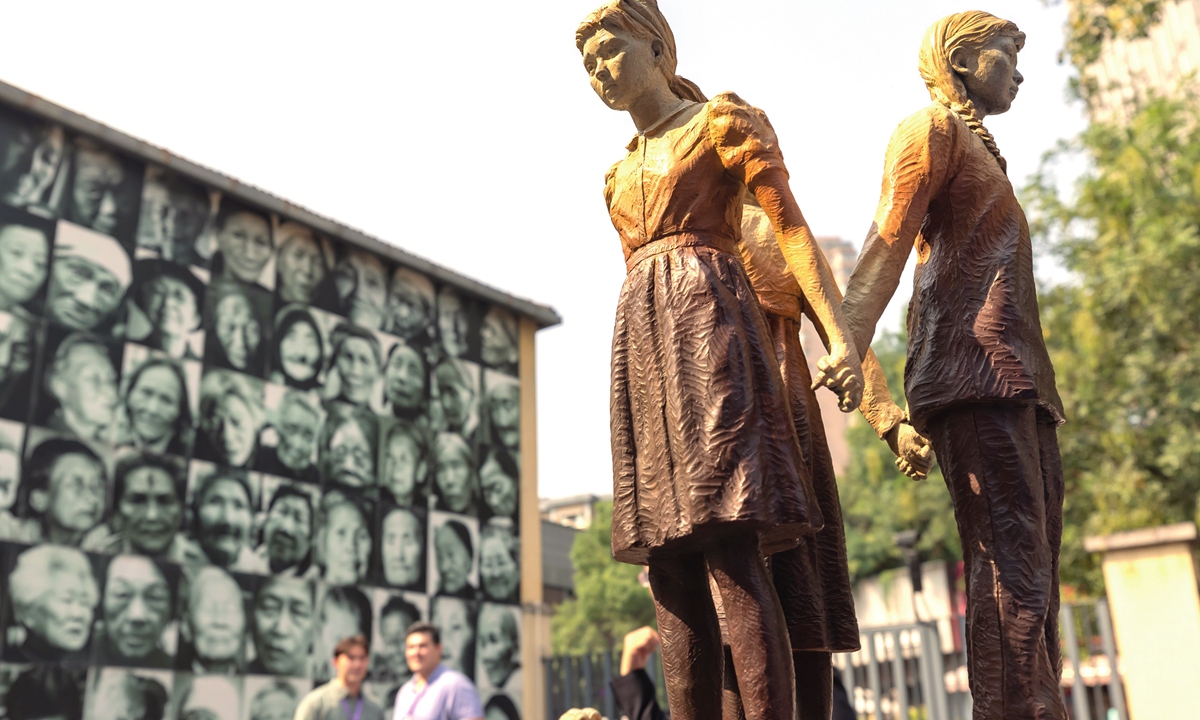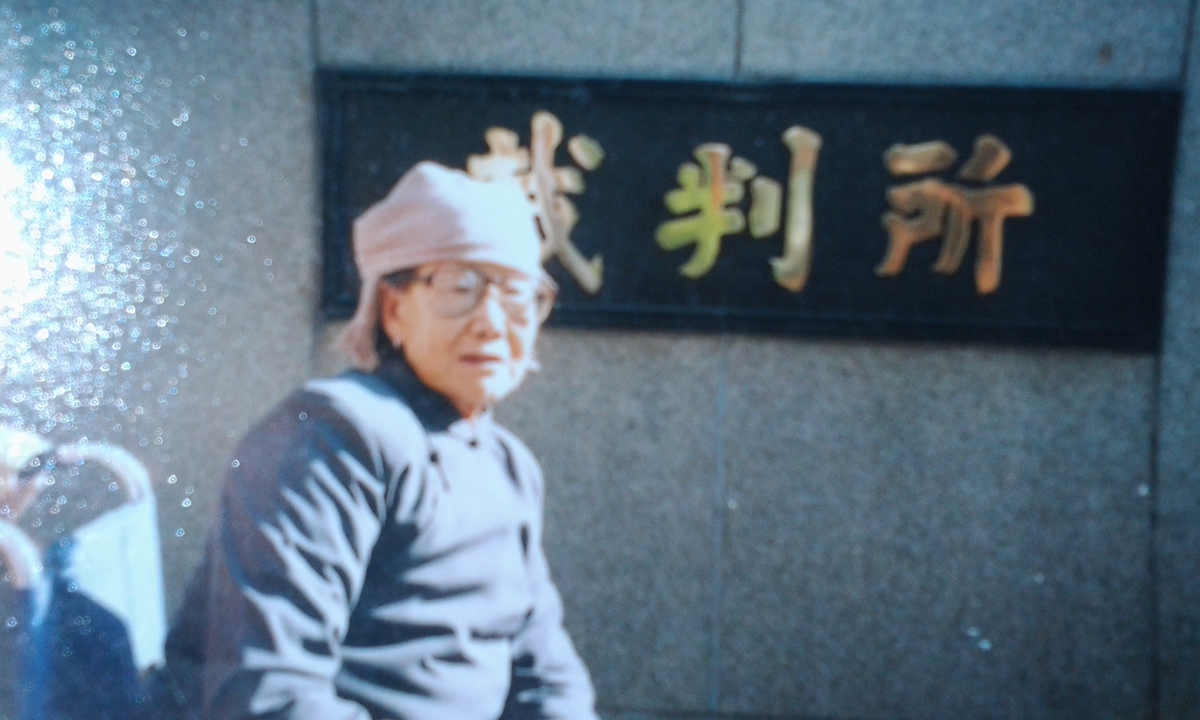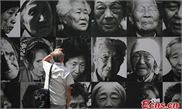Never-ending battles: First time Japan is sued in a Chinese court over ‘comfort women’ issues

The Memorial Hall for the victims of the Nanjing Massacre by Japanese invaders holds a ceremony to unveil a new "comfort women" themed statue at its branch museum on October 14, 2023. Photo: IC
Their battle has been going on for decades. Now, another round of fighting has begun.Two weeks ago, family members of 18 Chinese victims of the "comfort women" system filed a lawsuit with the Shanxi Provincial High People's Court in North China, demanding an apology and compensation over the Japanese military's atrocities against civilian Chinese women during the Chinese People's War of Resistance Against Japanese Aggression (1931-45).
This is the first time that these women have filed a lawsuit in China. In Japan, there have been nearly 30 lawsuits filed, the first of which was filed nearly 32 years ago. All of the lawsuits resulted in a disappointing outcome for the victims and their families.
This is a battle in the courtroom, but much more than that. After these atrocities have been ignored for years, the victims are crying out to be heard. After decades of pain and struggle, they are calling for the tarnished dignity and honor of their loved ones to be restored, and for Chinese law to be upheld.
All of the 18 "comfort women" victims in this case have already passed away. The victims' names were Zhao Runmei, Liu Mianhuan, Zhang Xiantu, Wang Gaihe, Yang Xihe, Hou Qiaoliang, Wan Aihua, Chen Lintao, Hou Dongtao, Gao Yine, Yang Shizhen, Zhou Xixiang, Yin Yulin, Nan Erpu, Zhao Cunni, Zhang Gaixiang, Guo Xicui and Li Xiumei.
Decades of fighting
The seventy-two-year-old Zhang Shuangbing has devoted half of his life to fighting for the rights of "comfort women" victims. Zhang hails from Yangquan, Shanxi, a city that witnessed many key battles during the War. At the same time, it also bore the brunt of numerous wars, with women forced into sexual slavery being a significant part of it.
In 1982, when Zhang was a rural teacher, he once learned that a woman in his village had been a "comfort women" victim, thus sparking a decades-long journey of investigation. He discovered that some of the victims had lost their ability to work, living their whole lives without income. Many were unable to bear children and ended up alone. Most of these victims had passed away during the war years and the decades that followed, with only a few still alive.
After encouraging and supporting these victims to speak out about their ordeal, Zhang managed to gather testimonies from 172 individuals, totaling hundreds of thousands of words. In 1992, he wrote and submitted the first complaint against the Japanese government regarding the sexual abuse by the Japanese army in China, which led to a 15-year transnational lawsuit.
During the legal process, 16 former victims were led by Zhang to Japan to testify in court. However, in 2007, the Japanese Supreme Court issued a final ruling rejecting their lawsuit.
Although the lawsuit in Japan ended in defeat, it still holds significant importance in terms of the awareness of the "comfort women" issue gained worldwide, analysts told the Global Times. While the Japanese high court ruled that the government was not obligated to compensate, it did acknowledge the existence of the atrocities.
With little hope of a court victory in Japan, the resolution of the "comfort women" issue seems to have stalled, a huge setback for the brave victims and Zhang. As more victims passed away, Zhang recalled to the Global Times how some of them, on their deathbeds, held his hand and urged him to restore their dignity.
2021 brought a new ray of hope when a Seoul court ordered the Japanese government to compensate each "comfort woman" with 100 million Korean won ($72,490). The successful predecessor gave inspiration and hope to Zhang and the families of the victims - if the Japanese court refuses to give a fair judgment, can we seek help from the domestic judicial system? He then approached lawyers Jia Fangyi and Guo Chengxi, proposing the possibility of filing a lawsuit in China.
The demands of these victims are very simple, Zhang told the Global Times. They just need an apology and financial compensation from the Japanese government.

Li Xiumei, one of the Chinese victims of the "comfort women" system, waits outside a Japanese court during their lawsuit in Japan in 1995. Photo: Courtesy of Guo Chengxi
A new battling round
After careful consideration, the lawyers answered with a resounding yes, they would be able to file a lawsuit in China. In the complaint drafted by the legal team, the plaintiffs are the family members of 18 "comfort women" victims. Some of them participated in the lawsuits filed in Japan.
The main reasons for the Japanese court's rejection of the ruling at that time were primarily two points: the San Francisco Treaty and the China-Japan Joint Statement. However, both of these documents only stipulate compensation between nations, and do not specify compensation for civilians harmed during the war. These are two different legal systems, so the Japanese court's rejection was not based on reasonable legal grounds, Jia told the Global Times. "Law is the most fundamental rationality of humanity," Jia said. "We are filing this lawsuit today because the then-Japanese government caused immense harm to Chinese civilians during the war, especially to the human rights of women civilians, but justice has never been served."
Actually, "comfort women" is a term used by perpetrators, referring to women who were subjected to continuous human rights violations by the Japanese military during wartime, he said. "This issue has long been a pain in the hearts of every Chinese, and Japan has never sincerely apologized or compensated for it."
Justice needs to prevail, he noted, and a legal ruling is one way to make it happen. "Otherwise, this issue will continue to harm the Chinese people."
Adjudicating cases of civilian harm in war and promoting compensation based on domestic law is currently an attempt being made by legal communities around the world, and the judgment in South Korea regarding a similar issue is a good example, the lawyers told the Global Times.
Compared to the judgments of international courts, the judgments of sovereign states actually have coercive force, Jia explained. At the same time, in a place where the violation actually occurred, experts of different fields are more likely to come together to collectively participate in the case, ensuring a wise, rational and legitimate resolution.
The lawyers also hope that this attempt will establish a precedent for China to use its own legal system and domestic laws to resolve compensation issues in cases where foreign governments violate the personal rights of Chinese citizens.
From Japan's recent official actions, it is also evident that the Japanese government has never reflected on this matter and it does not have a consistent attitude toward it, Da Zhigang, director of the Institute of Northeast Asian Studies at the Heilongjiang Provincial Academy of Social Sciences, told the Global Times.
Due to the established fact of atrocities and the weak defense of innocence put forth by the Japanese side, Da believes it is likely that the plaintiffs will win the case. However, the execution of the judgment and the implementation of compensation may pose another challenge due to the involvement of foreign governments and so many years having passed.


